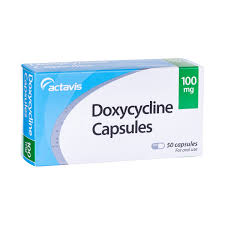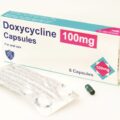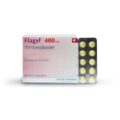Doxycycline is a tetracycline antibiotic that fights bacteria in the body. Doxycycline is used to treat many different bacterial infections, such as acne, urinary tract infections, intestinal infections, respiratory infections, eye infections, gonorrhea, chlamydia, syphilis, periodontitis (gum disease), and others.
How should this medicine be used?
Doxycycline comes as a capsule, delayed-release capsule, tablet, delayed-release tablet, and suspension (liquid) to take by mouth. Doxycycline is usually taken once or twice a day. Drink a full glass of water with each dose. If your stomach becomes upset when you take doxycycline, you may take it with food or milk. However, taking doxycycline with milk or food may decrease the amount of medication absorbed from your stomach. Talk with your doctor or pharmacist about the best way to take doxycycline. Follow the directions on your prescription label carefully, and ask your doctor or pharmacist to explain any part you do not understand. Take Doxycycline exactly as directed. Do not take more or less of it or take it more often than prescribed by your doctor.
Swallow the delayed-release tablets and the Acticlate CAP capsules whole; do not split, chew, or crush them.
If you cannot swallow certain delayed-release tablets (Doryx; generics) whole, carefully break up the tablet and sprinkle the contents of the tablet on a spoonful of cold or room temperature (not hot) applesauce. Be careful not to crush or damage any of the pellets while you are breaking up the tablet. Eat the mixture right away and swallow without chewing. If the mixture cannot be eaten right away it should be discarded.
Shake the suspension well before each use to mix the medication evenly.
If you are taking doxycycline for the prevention of malaria, start taking it 1 or 2 days before traveling to an area where there is malaria. Continue taking doxycycline each day you are in the area, and for 4 weeks after leaving the area. You should not take doxycycline for the prevention of malaria for more than 4 months.
Continue to take doxycycline even if you feel well. Take all the medication until you are finished unless your doctor tells you otherwise.
One doxycycline product may not be able to be substituted for another. Be sure that you receive only the type of doxycycline that was prescribed by your doctor. Ask your pharmacist if you have any questions about the type of doxycycline you were given.
Other uses for this medicine
Doxycycline may also be used for the treatment of malaria. It may also be used to treat Lyme disease or to prevent Lyme disease in certain people who have been bitten by a tick. It may also be used to prevent infection in people who were sexually attacked. Talk to your doctor about the possible risks of using this medication for your condition.
This medication is sometimes prescribed for other uses; ask your doctor or pharmacist for more information.
What special precautions should I follow?
Before taking doxycycline,
- tell your doctor and pharmacist if you are allergic to doxycycline, minocycline, tetracycline, demeclocycline, any other medications, sulfites, or any of the ingredients in doxycycline capsules, extended-release capsules, tablets, extended-release tablets, or suspension. Ask your pharmacist for a list of the ingredients.
- tell your doctor and pharmacist what prescription and nonprescription medications, vitamins, and nutritional supplements you are taking or plan to take. Be sure to mention any of the following: acitretin (Soriatane); anticoagulants (‘blood thinners’) such as warfarin (Coumadin, Jantoven); barbiturates such as butabarbital (Butisol), phenobarbital, and secobarbital (Seconal); bismuth subsalicylate; carbamazepine (Epitol, Tegretol, others); isotretinoin (Absorica, Amnesteem, Clavaris, Myorisan, Zenatane); penicillin; phenytoin (Dilantin, Phenytek); and proton pump inhibitors such as dexlansoprazole (Dexilant), esomeprazole (Nexium, in Vimovo), lansoprazole (Prevacid, in Prevpac), omeprazole (Prilosec, in Yosprala, Zegerid), pantoprazole (Protonix), and rabeprazole (Aciphex). Your doctor may need to change the doses of your medications or monitor you carefully for side effects.
- be aware that antacids containing magnesium, aluminum, or calcium, calcium supplements, iron products, and laxatives containing magnesium interfere with doxycycline, making it less effective. Take doxycycline 2 hours before or 6 hours after taking antacids, calcium supplements, and laxatives containing magnesium. Take doxycycline 2 hours before or 4 hours after iron preparations and vitamin products that contain iron.
- tell your doctor if you have or have ever had lupus (a condition in which the immune system attacks many tissues and organs including the skin, joints, blood, and kidneys), intracranial hypertension (pseudotumor cerebri; high pressure in the skull that may cause headaches, blurry or double vision, vision loss, and other symptoms), a yeast infection in your mouth or vagina, surgery on your stomach, asthma, or kidney or liver disease.
- you should know that doxycycline may decrease the effectiveness of hormonal contraceptives (birth control pills, patches, rings, or injections). Talk to your doctor about using another form of birth control.
- tell your doctor if you are pregnant, plan to become pregnant, or are breastfeeding. If you become pregnant while taking doxycycline, call your doctor immediately. Doxycycline can harm the fetus.
- plan to avoid unnecessary or prolonged exposure to sunlight and to wear protective clothing, sunglasses, and sunscreen. Doxycycline may make your skin sensitive to sunlight. Tell your doctor right away if you get a sunburn.
- you should know that when you are receiving doxycycline for the prevention of malaria, you should also use protective measures such as effective insect repellent, mosquito nets, clothing covering the whole body, and staying in well-screened areas, especially from early nighttime until dawn. Taking doxycycline does not give you full protection against malaria.
- you should know that when doxycycline is used during pregnancy or in babies or children up to 8 years of age, it can cause the teeth to become permanently stained. Doxycycline should not be used in children under 8 years of age except for inhalational anthrax, Rocky Mountain spotted fever, or if your doctor decides it is needed.
Can You Drink Alcohol With Doxycycline?
Do not drink alcohol while taking doxycycline. There are also some common medicines you should not mix with it. According to a study published in 2012, Doxycycline can increase sensitivity to the motor-impairing effects of alcohol and the duration of loss of righting reflex after ethanol injection, without causing a significant alteration in blood alcohol levels. In addition, drinking alcohol while taking antibiotics may increase this feeling of nausea due to the combined side effects. Although nausea is a common side effect of both antibiotics and alcohol, not all people will experience this when using both at the same time.
How long after stopping doxycycline can I drink alcohol?
It will be safe for you to drink alcohol 48 hours after stopping doxycycline. The reason why some health professionals recommend you avoid alcohol whilst you are taking antibiotics for an infection is to give your body the best chance possible to fight the infection. READ Can Doxycycline Treat Urinary Tract Infection (UTI)?






